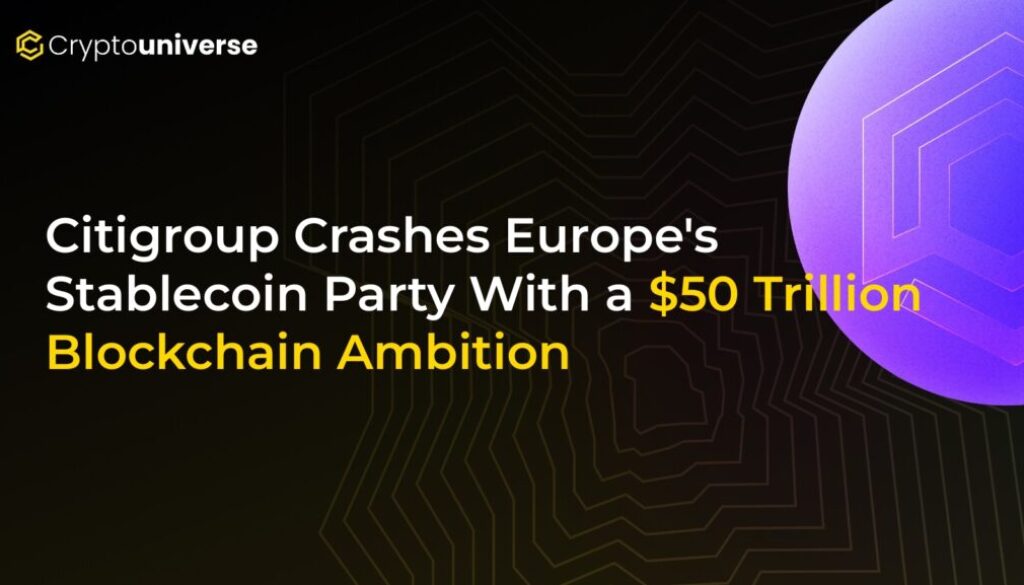Citigroup Crashes Europe’s Stablecoin Party With a $50 Trillion Blockchain Ambition

Wall Street Giant Makes a Bold Move into Europe’s Digital Future
In the world of high finance, some moves are louder than others. Citigroup just made a thunderous one. The American banking behemoth is gatecrashing an exclusive European party, joining a powerful consortium of nine lenders to launch a regulated, euro-backed stablecoin. This isn’t just another digital experiment; it’s a strategic play for a piece of a market that could be worth an astonishing $50 trillion by 2030.
By positioning itself as the only non-European bank in this alliance, Citigroup is planting its flag firmly in the future of digital payments on the continent, signaling a major shift in how traditional financial institutions view blockchain technology.
The Alliance: Building a Digital Fortress for the Euro
The plan is ambitious and well-defined. Citigroup is teaming up with a roster of European banking heavyweights, including:
- ING Groep
- UniCredit
- DekaBank
- And six other major lenders
Together, they have established a new entity based in the Netherlands specifically to oversee this project. The goal? To launch a fully regulated, compliant euro stablecoin in the second half of 2026. For the European banks, the mission is clear: to enhance the continent’s “strategic autonomy” in the global payments landscape.
In a market overwhelmingly dominated by US dollar-pegged tokens, this initiative represents a concerted effort to build a credible, homegrown digital euro system, reducing reliance on foreign infrastructure and currencies for the future of finance.
Why Now? The Glaring Gap in the Stablecoin Market
To understand the magnitude of this move, you just need to look at the numbers. The total stablecoin market supply hovers around $300 billion. Yet, the value of euro-based stablecoins is a mere $477 million—a tiny fraction of the total. The digital world effectively runs on the dollar.
This massive imbalance presents a golden opportunity. As blockchain technology becomes more integrated into mainstream commerce, the demand for a stable, reliable, and regulated digital euro is set to explode. Bloomberg Intelligence forecasts that stablecoins could process over $50 trillion in payments annually by 2030. That would mean nearly a quarter of all consumer transactions could one day flow through blockchain rails.
The European consortium, with Citigroup now in its ranks, is not just building a new token; it’s building the foundational infrastructure to capture a significant share of this future economy.
Citigroup’s Broader Blockchain Vision
This partnership is not an isolated bet for Citigroup. It’s a key piece of a much larger, multi-faceted strategy to embrace digital assets. The bank’s recent activities paint a clear picture of its intentions:
- Venture Investments: Citigroup’s venture arm recently backed BVNK, a firm specializing in stablecoin infrastructure for payments.
- Institutional Collaboration: The bank has joined forces with rivals like Goldman Sachs and Bank of America to explore digital money systems for large-scale institutional payments.
- In-House Exploration: CEO Jane Fraser has publicly confirmed that Citigroup is actively considering launching its own proprietary stablecoin, signaling a deep, long-term commitment to the technology.
These moves demonstrate that Citigroup sees blockchain not as a disruptive threat, but as the next evolutionary step for global finance. The bank is positioning itself to be a central player, leveraging its legacy, trust, and scale to lead in the digital age.
The Future is Tokenized
Citigroup’s entry into the European stablecoin project is more than just a headline. It’s a landmark moment where the old guard of finance fully embraces the new. As Wall Street’s digital ambitions merge with Europe’s quest for monetary sovereignty, the line between traditional finance (TradFi) and the crypto world is becoming increasingly blurred.
The race is on to build the regulated, scalable, and trusted stablecoins that will power the next generation of global commerce. With its latest move, Citigroup has made it clear it doesn’t just want a seat at the table—it wants to help build it.


